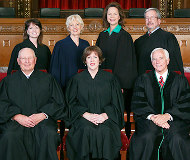Article from: www.thenewspaper.com/news/45/4520.asp
9/22/2014
Ohio Supreme Court Slams City That Blocked Anti-Camera Vote
Highest court in Ohio insists the public has a constitutional right to vote on banning automated ticketing machines.
 The law director of Maple Heights, Ohio was left with egg on his face as the state Supreme Court wholly rejected the legal arguments he came up with to block a public vote on red light cameras and speed cameras. In a unanimous decision Friday, the six justices insisted that the city's attempts to drag its feet and avoid a public vote on the operation of speed cameras and red light cameras violated the clear legal requirement of the state constitution that the council put a measure on the ballot "forthwith" once the signatures are certified.
The law director of Maple Heights, Ohio was left with egg on his face as the state Supreme Court wholly rejected the legal arguments he came up with to block a public vote on red light cameras and speed cameras. In a unanimous decision Friday, the six justices insisted that the city's attempts to drag its feet and avoid a public vote on the operation of speed cameras and red light cameras violated the clear legal requirement of the state constitution that the council put a measure on the ballot "forthwith" once the signatures are certified.
"Whether council delayed passage of an ordinance deliberately or negligently is not relevant," the court wrote. "The Maple Heights City Council received verification of the signatures more than two weeks before the constitutional deadline of September 5 and conducted two regular council meetings in the interim. Its failure to enact an ordinance at the second meeting fell well short of acting 'forthwith.'"
The council acted on the advice of law director John J. Montello who petition circulators called "condescending" for his response that belittled petition organizers as if they did not understand the requirements for an initiative.
"To begin, your letter is full of misinformation including the spelling of your own name," Montello wrote in an August 21 letter to petition circulators. "It is obvious that you have not consulted the city charter. Therefore, your request is respectfully denied."
Montello told the city council that losing the cameras would hurt the Maple Heights financially and that the council could not vote on putting the measure on the ballot without holding multiple readings on the proposed ordinance that would put off consideration for months -- well past the November election. This proved to be untrue.
"A municipal legislature may waive that rule at any time by a three-fourths vote of the members," the court noted.
The justices cited a ruling in which the court had previously held that a city council fails in its duty if it does not hold a special session to deal with an election matter before the voting deadline. The justices also insisted that the city to pay the attorneys who represented the petition circulators.
"We hereby grant a writ of mandamus and order the city council of Maple Heights to act immediately to approve an ordinance placing the charter amendment initiative on the November 4, 2014 election ballot," the court ruled. "Relators are ordered to submit a bill and documentation to support their request for attorney fees within ten days of this judgment."
A copy of the decision is available in a PDF file at the source link below.
Source: Committe for Charter Amendment v. Maple Heights (Ohio Supreme Court, 9/19/2014)
Permanent Link for this item
Return to Front Page
 The law director of Maple Heights, Ohio was left with egg on his face as the state Supreme Court wholly rejected the legal arguments he came up with to block a public vote on red light cameras and speed cameras. In a unanimous decision Friday, the six justices insisted that the city's attempts to drag its feet and avoid a public vote on the operation of speed cameras and red light cameras violated the clear legal requirement of the state constitution that the council put a measure on the ballot "forthwith" once the signatures are certified.
The law director of Maple Heights, Ohio was left with egg on his face as the state Supreme Court wholly rejected the legal arguments he came up with to block a public vote on red light cameras and speed cameras. In a unanimous decision Friday, the six justices insisted that the city's attempts to drag its feet and avoid a public vote on the operation of speed cameras and red light cameras violated the clear legal requirement of the state constitution that the council put a measure on the ballot "forthwith" once the signatures are certified.